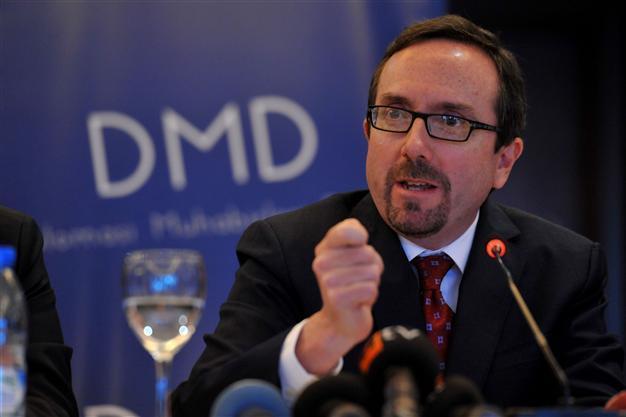U.S. doesn’t want to see violence return to Turkey: U.S. Ambassador
Sevil Erkuş - ANKARA

CİHAN Photo
The United States does not want to see a return to violence in Turkey, Washington’s envoy to Ankara has said, urging both the government and the Kurdish movement to remain committed to the peace process.
“The last thing that citizens of Turkey need, the last thing anyone in the region needs, is the resumption of conflict inside Turkey and another conflict in this region. We already have too many conflicts, too much violence in this region. For that reason, among many others, we continue to strongly support the process of discussing a peaceful outcome and ongoing discussions about what that requires,” John Bass said at a meeting with the Diplomacy Correspondents’ Association on May 4.
The U.S. does not “want to see a return to violence,” the envoy said, underlying the importance “for the parties to remain committed to the process.”
Turkey, US set to sign agreement on foreign fighters
Elaborating on an upcoming agreement between Turkey and the U.S. to be signed on the issue of foreign fighters transiting Turkey en route to Syria, the ambassador indicated a mechanism on the sharing of information among coalition members about potential fighters for the Islamic State of Iraq and the Levant (ISIL).
“We are working now with the government of Turkey on specific details on how we can better share information about people we know to be extremists, people we suspect of being extremists who bear a degree of additional attention and scrutiny from governments because of the nature of some of their activities in the past. Given how quickly information [moves] – but also how people are able to move in the modern era – it’s important for governments to be able to respond to those movements quickly,” said the ambassador.
The countries have focused on how to improve the coordination between Turkey, the U.S. and other members of the coalition to reduce those time lags to understand when potential foreign fighters are moving, the ambassador said.
Elaborating on the cooperation between the two countries to defeat ISIL, Bass said an important piece of the issue is the agreement to train, equip and support members of the moderate Syrian opposition to enable them to “first of all better protect Syrian people from threats and violence that Syrian people face from Daesh [ISIL], and from the regime.”
Second, Washington and Ankara want to help them develop better capabilities to stabilize the areas under their control, he said. “Third, [we want] to improve their ability to take action on the battlefield which we hope over time will help reinforce with President [Bashar] al-Assad that there is no military solution in this conflict and that there needs to be a negotiated settlement to this conflict.”
He did not go into specifics for the use of the İncirlik Airbase as part of efforts to defeat and degrade ISIL, but said İncirlik was central to all of their efforts in the region on the shared security challenges with the government of Turkey.
Presidency a matter for Turkish people
The envoy said the nature of Turkey’s democracy was a matter for Turkish citizens to decide whether to proceed with a presidential system or a strong parliamentarian system.
“That is not for the U.S. to decide, and we respect the ability of Turkish citizens to make informed choices,” he said.
“It’s important that citizens in Turkey feel that this is change if it happens that is being done with them as opposed to change that is being done to them. From our perspective, the system is not the essential piece.”
Bass said his government was watching the present electoral campaign with interest, as they do for all other NATO member states.
“We are supporting everyone in society who wants to ensure this election is free and fair and competitive and that all of the voters in this election have the opportunity to go to polls and make informed choice based on their ability to have access to information about candidates and party issues that are of concern to them.”
Deportation of Fethullah Gülen
Asked about the Turkish government’s request for the deportation of U.S.-based Islamic scholar Fethullah Gülen, Bass said his administration did not comment on actual or hypothetical individual deportation cases.
“We apply judicial process rigorously, fairly and impartially based on the evidence that is presented to us when we receive the request,” he said.
“It’s important for everyone in Turkey given the nature of the allegations to have confidence that the judicial proceedings will occur in transparent and impartial manner so that everyone has confidence in the result,” the ambassador said.
Blond photo speaks for itself
Bass did not want to elaborate on his humorous reaction after Ankara’s mayor called a U.S. State Department spokeswoman a “stupid blond.”
“My photo stands for itself and speaks for itself. The mayor made his point; I made mine,” Bass said about a picture he posted on his Instagram account with his normally dark hair digitally altered to a reddish blond. The caption said: “American diplomats: we’re all blonde.”
The U.S. ambassador did not directly criticize freedom of press in Turkey, but said it concerns Washington when governments anywhere are “selective in terms of which publications and which points of view have access to official government events.”
The U.S. is currently talking with Turkey and other parties to see how they can all support the efforts of the U.N. envoy on Cyprus, Espen Barth Eide, to realize a solution on the island.
“You’ll be seeing energy and commitment from the U.S. to support that effort,” he said.
